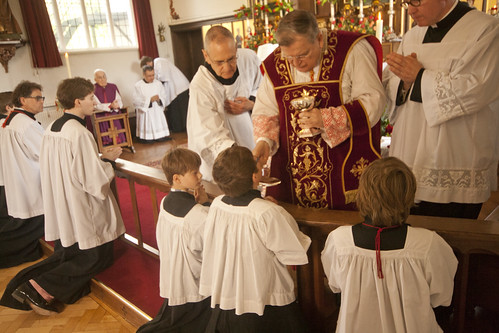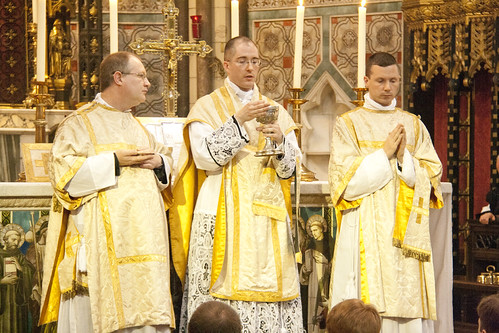 |
| Cardinal Burke disctributes Holy Communion at a Low Mass in Oxford |
Those who expected Pope Francis to clamp down on the traditional liturgy, freed by Benedict XVI, have reason to be disappointed. Just last week Archbishop Malcolm McMahon of Liverpool announced that the impressive Pugin church of St Mary in Warrington would become a centre for the Extraordinary Form run by the Fraternity of St Peter. This brings to five the number of English dioceses that have welcomed either the fraternity or the Institute of Christ the King, another priestly institute dedicated to the traditional liturgy.
...
Even those who hadn’t prejudged Pope Francis’s papacy may be puzzled by these developments, which are not confined to England. Policy directly attributable to the Holy Father has smiled upon the Society of St Pius X (SSPX), a priestly institute dedicated to the traditional liturgy which was supposedly suppressed in 1975 and has been operating since then without Rome’s oversight.
...
Developments are being pushed along by something deeper, however, than the personal interests of popes. The inexorable turnover of the generations is having a transformative effect on attitudes within the Church. Only people now over 70 could have been caught up in the excitement of the liturgical reform as adults, and experienced what Benedict XVI called “all its hopes and its confusion”. They are being replaced by people with less emotional commitment, one way or the other: a generation that can take a step back and consider the matter dispassionately.
Read the whole thing.
Support the work of the LMS by becoming an 'Anniversary Supporter'.
 |
| Fr Ian Verrier FSSP, a newly ordained priest, celebrates Mass in St James' Spanish Place |
I fail to see a direct link link between to support the supposition.
ReplyDeleteBetween what?
DeleteAs a professor of theology at Oxford Joseph, you do not have the freedom to teach the old ecclesiology without Cardinal Francesco Marchetti Selvaggiani's irrational inference.This issue is also central to offering the Traditional Latin Mass under the pontificate of Pope Benedict XVI and Pope Francis.
ReplyDeleteWithout Cardinal Francesco Marchetti Selvaggiani's irrationality, used in the interpretation of Vatican Council II ,no priest is being allowed to offer the Traditional Latin Mass or the Novus Ordo Mass. This was not mentioned in the article.
The article in the CH does not say that the let and and let live attitude is restricted to only those who discard the old ecclesiology. It is a live and let live attitude only when it is the old rite with the new ecclesiology.
If a Catholic priest in England were to affirm the dogma extra ecclesiam nulla salus in accord with Vatican Council II he would get the same treatment as the Franciscan Friars of the Immaculate.
Why did Vatican Council II have to mention being saved in invincible ignorance and the baptism of desire in Vatican Council II (AG 7,LG 14) along with orthodox passages ? It was to accomodate the error which came from the 1949 Letter of the Holy Office.This error was approved by Pope Pius XII.
Example:
A
Here is the orthodox passage in Ad Gentes 7 in accord with the dogma extra ecclesiam nulla salus.
Therefore, all must be converted to Him, made known by the Church's preaching, and all must be incorporated into Him by baptism and into the Church which is His body. For Christ Himself "by stressing in express language the necessity of faith and baptism (cf. Mark 16:16; John 3:5), at the same time confirmed the necessity of the Church, into which men enter by baptism, as by a door.-AG 7
B
The following passage in Ad Gentes 7 is based on Marchetti assuming being saved in invincible ignorance and the baptism of desire were explicit for us in the present times, and so were exceptions to the traditional Feeneyite version of the dogma on salvation.
Therefore those men cannot be saved, who though aware that God, through Jesus Christ founded the Church as something necessary, still do not wish to enter into it, or to persevere in it."(17) Therefore though God in ways known to Himself can lead those inculpably ignorant of the Gospel to find that faith without which it is impossible to please Him (Heb. 11:6)-AG 7
If you interpret B as being implicit, invisible for us and known only to God , it is not an exception to A. The ecclesiology remains traditional.
The New Ecclesiology is based on accepting B as being explicit, objecitve and seen in the flesh, in the present times.
So can the Traditional Latin Mass be offered by priests who consider B not an exception to A? No mention of this in your article.
Why did Vatican Council II have to mention 'imperfect communion with the Church'(UR3) or 'seeds of the word'(AG 11) as means of salvation? It is because of the error in 1949 which infers there is known salvation outside the Church and all do not need to be formal members of the Church in the present times.This is the new theology, it is based on their being known salvation outside the Church, all not needing 'faith and baptism'(AG 7). This is the new ecclesiology it is a rejection of Feeneyism with an irrational premise ( salvation with the baptism of desire etc are personally known in the present times) and irrational inference ( since they are known BOD, BOB, I.I. refer to known exceptions to the Feeneyite version of extra ecclesiam nulla salus).
So can a priest offer the Traditional Latin Mass when he considers Vatican Council II as not being a break with the rigorist interpretation of the dogma extra ecclesiam nulla salus, since salvation in Heaven is not visible to us on earth, for any one to be exceptions to the old ecclesiology ?
This point was not covered in your article.
ReplyDeleteCatholic priests are only allowed to offer Mass if they say B is an exception to A
http://eucharistandmission.blogspot.it/2015/07/catholic-priests-are-only-allowed-to.html
Neither Pope Francis, nor any other Pope has authority to forbid or clamp down on the Usus Antiquior, not after the Church has evolved it as the main form of worship over the centuries and after Quo Primum.
ReplyDeleteAny Pope has authority to declare/create and new form of the Mass, the Ordinariate being a good example, but that in no way can that have precedence over the Usus Antiquior. So Pope Francis will probably leave well alone.
Time will take care of things. Predictive science, politics and religion are unreliable, but, given the drastic continuing decline in the Novus Ordo clergy at present and the small but steady growth in the traditional orders, France is the classic example and we in the UK are not far behind, in say 20 years, the Usus Antiquior will be the pre-eminent Mass in a no-doubt very much smaller European Church.